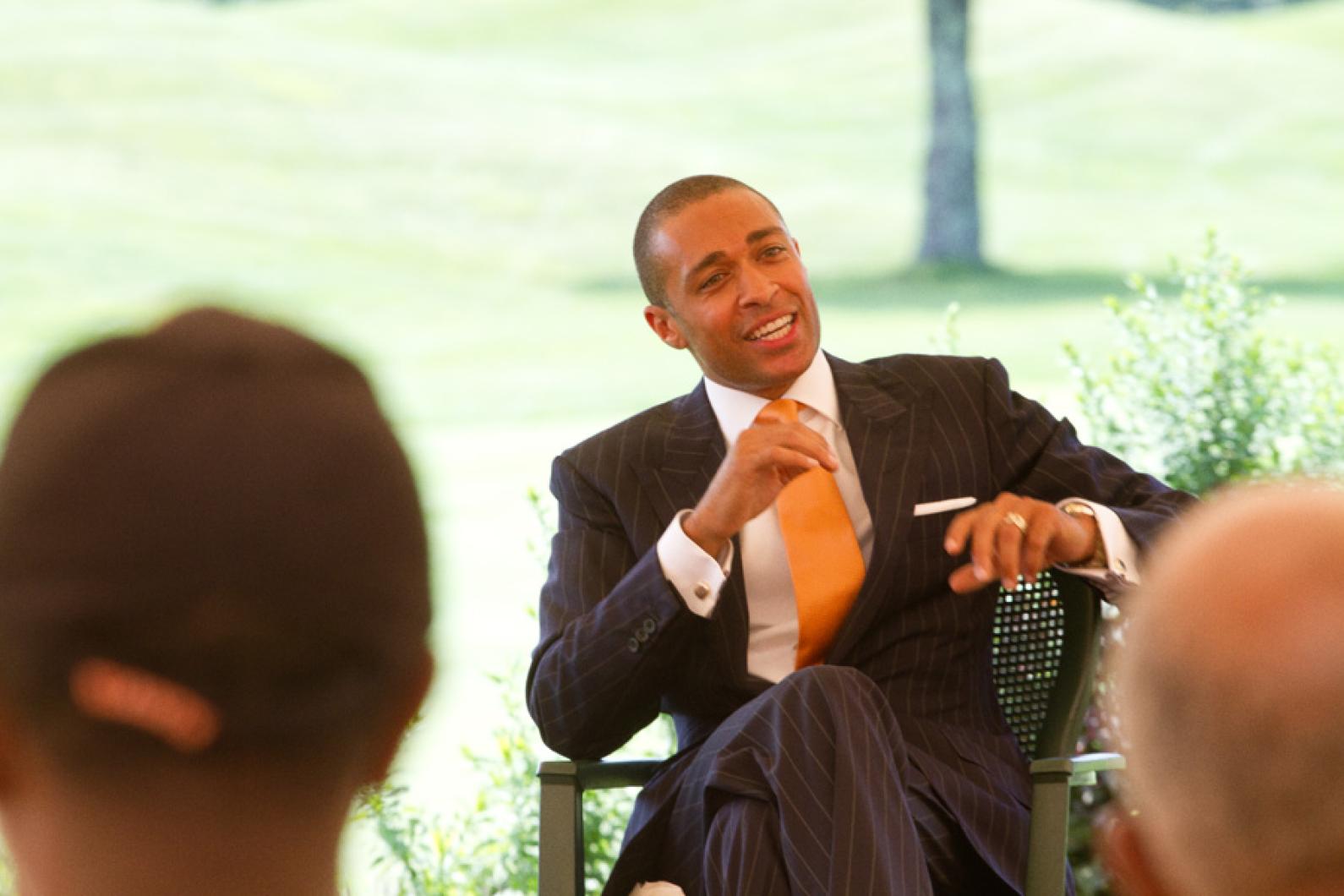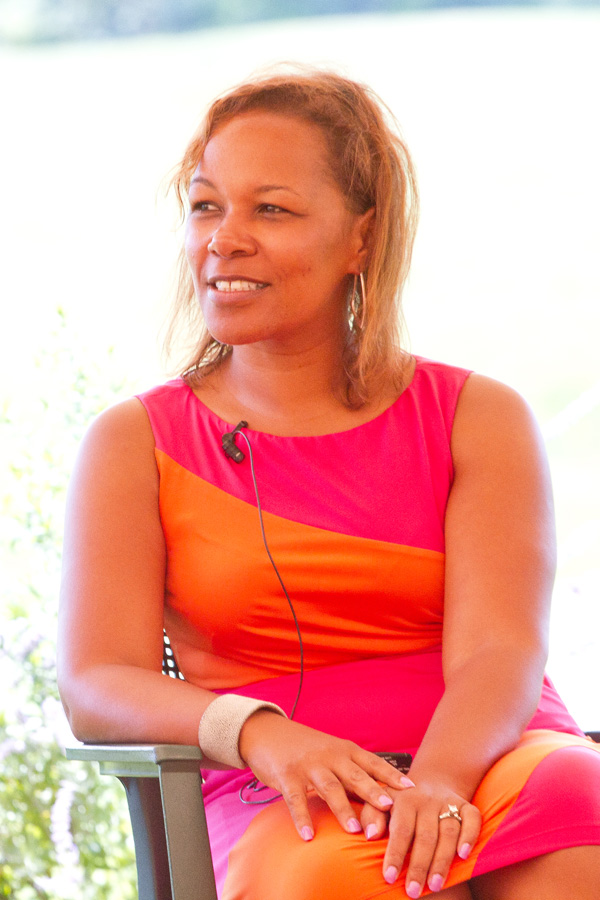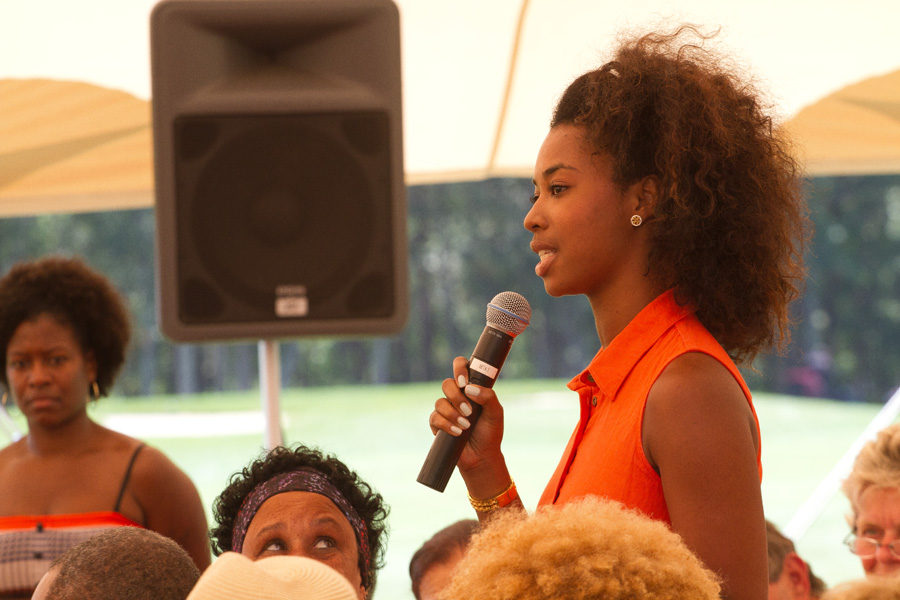With the presidential election only months away, activists throughout the country are joining forces to fight recent voter identification laws that they say threaten voting access.
On Friday morning, more than 100 people gathered to participate in a forum on voting rights organized by the legal rights organization Advancement Project. Panelists included T.J. Holmes, a former CNN anchor; Rev. Raphael Warnock, the senior pastor of the Ebenezer Baptist Church, spiritual home of The Rev. Dr. Martin Luther King Jr. in Atlanta, Ga. and Judith Browne-Dianis, co-director of the Advancement Project.
The panelists began by commenting on the choice of venue — the dining room of the Farm Neck Golf course in Oak Bluffs. “We are having a discussion about protecting the right to vote while the white dude is teeing off on the 17th hole,” Mr. Holmes joked. “That juxtaposition is hilarious to me. We’ll have to make sure we wave [to the golfer].”
The choice of venue was not deliberately political, organizers said. They had heard it was a nice spot, “a place where you could have a peaceful conversation about a hard topic,” said Edward Hailes Jr., an Advancement Project organizer. “For an organization that works in support of grassroots movements, grass is a reminder of the movement we are a part of,” he said.
“We should be talking about voting rights everywhere,” Ms. Browne-Dianis said.
The Advancement Project is a legal policy and strategic communications action tank based in Washington, D.C. and Los Angeles. The organization employs social media and geographical mapping to inform the public about issues they consider to be threatening the American democratic process.
Friday’s forum was the group’s first event on the Island. “We wanted to do an event on Martha’s Vineyard because we know that there is a cadre of prominent people that vacation there, that care about civic engagement and voting,” Ms. Browne-Dianis said. “We know that many of the people who vacation here are active — in politics, in corporate life, in their communities.”
Discussion centered around recent identification laws that have been taken up in 34 states, and the effects of voter restrictions on the 2012 campaign. These laws require voters to display identification in order to receive a ballot. Groups like Advancement Project claim that the laws unfairly target minorities, students and the elderly because these people are more likely not to carry valid identification.
“This is about politics,” declared Ms. Browne-Dianis. “These laws are surgically crafted to hit those who showed up in record numbers to vote [in the 2008 presidential election]. We are having the rhetoric of voter fraud, but that is not what this is about.”
Panelists made their case for the importance of voting rights in the upcoming election, discussed plans for action and answered questions from the audience. “You are more likely to be struck by lightning than to find a case of voter fraud,” Ms. Browne-Dianis said.“Voter fraud is a myth perpetuated by conservatives to prevent Democrats from voting.”
The group also held a small event before the forum for prospective donors. Advancement Project, which has traditionally been foundation-supported, is in the midst of launching an individual donor campaign.
It was a call to action, organizers said. Mr. Warnock spoke about the need for black church leaders to call parishioners to action,and dedicate themselves to the “moral” responsibility of exercising the right to vote. “It’s a sin not to vote,” he declared. “If you need a Bible verse — to whom much is given, much is required.” He said many in the church have lost their dedication to “communal uplift,” and said change could come about through a joint effort of legal and religious activism. “We really need a movement. Martin Luther King and Thurgood Marshall. We’ve got to have both,” he said.
Mr. Holmes spoke about his new television show, Don’t Sleep, which will air on Black Entertainment Television (BET) between 11 p.m. and 2 a.m. and targets African Americans between the ages of 18 and 34 years. Activists say this group of eligible voters is the hardest to reach, especially those who do not attend college. Mr. Holmes’s show, which debuts in October, intends to engage young black Americans in a conversation about politics and social issues. Many audience members discussed the challenge of the young voter. One suggested offering free music downloads to youth who register to vote online. “It’s a matter of reaching us in our environment,” said a young woman who served as unofficial spokeswoman for the young.
The clock is ticking for organizers who have begun to spread the word about new laws. “We discussed a really important issue that is timely and of concern to so many Americans who really treasure the right to vote, and know that it is precious,” Ms. Browne-Dianis said.






Comments
Comment policy »